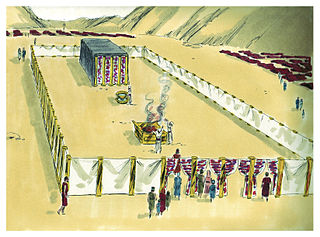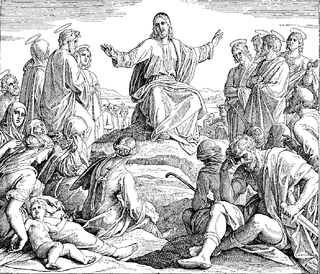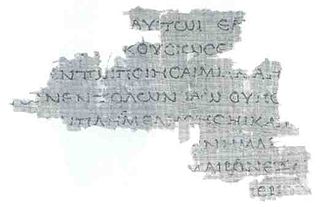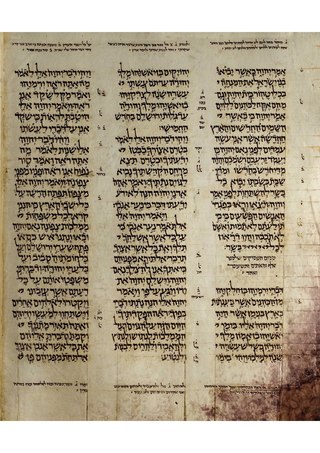
Leviticus 18 deals with a number of sexual activities considered abominable, including incest and bestiality. The chapter also condemns Moloch worship. It is part of the Holiness Code, and its sexual prohibitions are largely paralleled by Leviticus 20, except that chapter 20 has more emphasis on punishment.

Matthew 5:43 is the forty-third verse of the fifth chapter of the Gospel of Matthew in the New Testament and is part of the Sermon on the Mount. This verse is the opening of the final antithesis, that on the commandment to "Love thy neighbour as thyself".
The prohibition against slaughtering an animal and its offspring on the same day is a negative commandment in Judaism which forbids the slaughter of a kosher four-legged animal and its offspring on the same day.

The manuscript 4Q120 is a Septuagint manuscript (LXX) of the biblical Book of Leviticus written on papyrus, found at Qumran. The Rahlfs-No. is 802. Paleographically it dates from the first century BCE. Currently the manuscript is housed in the Rockefeller Museum in Jerusalem.

Song of Songs 1 is the first chapter of the "Song of Songs" or "Song of Solomon", a book of the Hebrew Bible or Old Testament of the Christian Bible. This book is one of the Five Megillot, a group of short books, together with Ruth, Lamentations, Ecclesiastes and Esther, within the Ketuvim, the third and the final section of the Hebrew Bible. Jewish tradition views Solomon as the author of this book, and this attribution influences the acceptance of this book as a canonical text. Song of Songs 1 contains the book's superscription, songs of the main female characters, and the opening song of the male character.
Isaiah 3 is the third chapter of the Book of Isaiah in the Hebrew Bible or the Old Testament of the Christian Bible. This book contains the prophecies attributed to the prophet Isaiah, and is one of the Books of the Prophets. This chapter describes how the corrupt leadership brought about the collapse of the social condition of Jerusalem, and contains Isaiah's prophecies that "For the sin of the people, God will take away the wise men, and give them foolish princes".

Jeremiah 11 is the eleventh chapter of the Book of Jeremiah in the Hebrew Bible or the Old Testament of the Christian Bible. This book contains prophecies attributed to the prophet Jeremiah, and is one of the Books of the Prophets. This chapter includes the first of the passages known as the "Confessions of Jeremiah".

Jeremiah 19 is the nineteenth chapter of the Book of Jeremiah in the Hebrew Bible or the Old Testament of the Christian Bible. This book contains prophecies attributed the prophet Jeremiah, and is one of the Books of the Prophets.

Jeremiah 27 is the twenty-seventh chapter of the Book of Jeremiah in the Hebrew Bible or the Old Testament of the Christian Bible. The material found in Jeremiah 27 is found in Jeremiah 34 in the Septuagint, which orders some material differently. This book contains prophecies attributed to the prophet Jeremiah, and is one of the Books of the Prophets. The New American Bible (NABRE) describes chapters 27-29 as "a special collection of Jeremiah’s prophecies dealing with false prophets", and suggests that "stylistic peculiarities evident in the Hebrew suggest that these three chapters once existed as an independent work".

Jeremiah 34 is the thirty-fourth chapter of the Book of Jeremiah in the Hebrew Bible or the Old Testament of the Christian Bible. It is numbered as Jeremiah 41 in the Septuagint. This book contains prophecies attributed to the prophet Jeremiah, and is one of the Books of the Prophets. This chapter anticipates the final moments in the assault of the Babylonian army against Jerusalem, when Jeremiah foretold the destruction of the city and the captivity of King Zedekiah, and sharply criticized the treacherous dealings of the princes and people with the slaves that provoked the punishment from God.
Textual variants in the Gospel of Mark are the subject of the study called textual criticism of the New Testament. Textual variants in manuscripts arise when a copyist makes deliberate or inadvertent alterations to a text that is being reproduced. An abbreviated list of textual variants in this particular book is given in this article below.
Textual variants in the Gospel of Luke are the subject of the study called textual criticism of the New Testament. Textual variants in manuscripts arise when a copyist makes deliberate or inadvertent alterations to a text that is being reproduced. An abbreviated list of textual variants in this particular book is given in this article below.

Paleo-Hebrew Leviticus Scroll, known also as 11QpaleoLev, is an ancient text preserved in one of the Qumran group of caves, and which provides a rare glimpse of the script used formerly by the Israelites in writing Torah scrolls during pre-exilic history. The fragmentary remains of the Torah scroll is written in the Paleo-Hebrew script and was found stashed away in cave no. 11 at Qumran, showing a portion of Leviticus. The scroll is thought to have been penned by the scribe between the late 2nd century BCE to early 1st century BCE, while others place its writing in the 1st century CE.
Textual variants in the Hebrew Bible manuscripts arise when a copyist makes deliberate or inadvertent alterations to the text that is being reproduced. Textual criticism of the Hebrew Bible has included study of its textual variants.
Ecclesiastes 11:3 is the third verse in the eleventh chapter of the Book of Ecclesiastes in the Hebrew Bible.
Textual variants in the Book of Exodus concerns textual variants in the Hebrew Bible found in the Book of Exodus.
Textual variants in the Book of Judges concerns textual variants in the Hebrew Bible found in the Book of Judges.
Textual variants in the Book of Deuteronomy concerns textual variants in the Hebrew Bible found in the Book of Deuteronomy.
Textual variants in the Book of Genesis concerns textual variants in the Hebrew Bible found in the Book of Genesis.
Textual variants in the Numbers concerns textual variants in the Hebrew Bible found in the Book of Numbers.

 : Old Latin / Vetus Latina (list)
: Old Latin / Vetus Latina (list)







